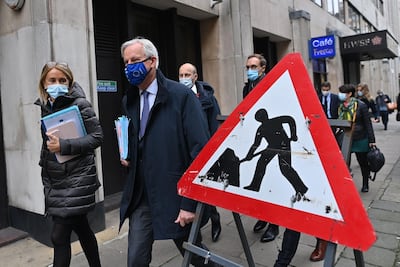Talks between the EU and UK are coming down to the wire as both sides acknowledge the coming weeks as critical to striking a deal.
The issue is becoming more urgent as Britain’s departure from the single market on December 31 fast approaches.
Because both sides need time to ratify and implement any accord, they need to strike a deal before then.
Without one, millions of consumers will face the return of quotas and tariffs for the first time in a generation.
What do both sides agree on?
While nothing is agreed until the final moment, both sides want a free trade deal, with no tariffs or quotas on either side.
While there are areas of disagreement, key concessions have been made to reach the final stretch, among them an alignment on EU product standards and regulations.
The EU acknowledges that the UK will not be sticking to all of its laws but has instead asked for consistency on where it will diverge.
For its part, the UK says it will not arbitrarily create its own rules simply for the sake of being different.
The UK also accepted that trade will not be entirely without friction.
What issues remain?
Fishing
The UK wants British waters to be first and foremost for British boats – a reality the EU is desperately trying to avoid.
Under the Common Fisheries Policy, of which the UK is part of until the end of the year, fishing fleets of every country have access to each other’s waters, with the exception of the first 12 nautical miles from the coast.
When the UK leaves the EU it will control an exclusive economic zone of 200 nautical miles from its coast, giving it much greater control over what is caught and where the fish are sold. The EU wants the same level of access as it has now, a demand not well-received by some in Britain’s fishing industry, and while the EU can compensate its fishermen with subsidies, many argue that won’t make up for the potential losses.
Last month, some of the key voices in Britain’s fishing industry wrote an open letter to the Environment Secretary, George Eustice, which said many fishing businesses face collapse should a no-deal Brexit materialise.
Current procedures the government says will be needed to export fish after the transition period, the letter added, “will have a seriously detrimental effect on fish exports from the UK and on the future viability of large segments of the catching sector, auction houses, merchants and processors”.
Level playing field
Throughout negotiations, the EU has said that it wants trade with the UK to be as fair and competitive as possible, especially when it comes to workers’ rights, state aid and environmental protection.
Brussels wants the baseline to remain at EU-level standards, a position with which London is uncomfortable.
Ursula von der Leyen, European Commission President, said at the start of this year: “Without a level playing field on environment, labour, taxation and state aid, you cannot have the highest quality access to the world’s largest single market.”
As Brexit has been all about the UK’s ability to “take back control”, adhering to the EU’s wishes on competition hasn’t gone down well with Brexiteers as officials argue they need the policy space to make the best decisions for British businesses.
The UK left the EU on January 31 but agreed to follow EU rules until December 31 as negotiations on a deal continued.
If time runs out and a deal cannot be ratified in time, trade between the UK and EU will default to World Trade Organisation rules, which would see costly tariffs introduced, hitting businesses on both sides of the channel.
Governance
Another area of disagreement is how any deal would be enforced.
The EU insists that the European Court of Justice should oversee adherence to the deal, however, after Britain leaves the EU, the court will not have jurisdiction in the UK.
The UK's Internal Markets Bill - which could override parts of the withdrawal agreement and break international law - has added to EU concerns that Britain will not live up to its end of the deal on governance.


